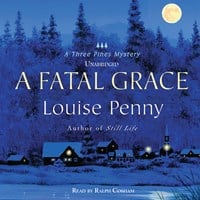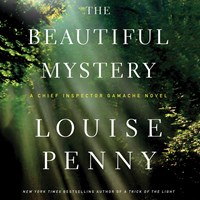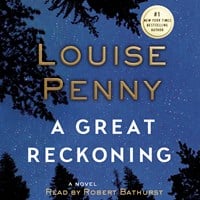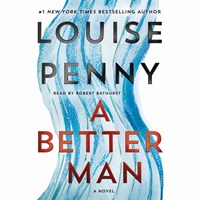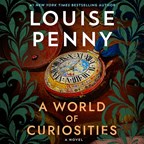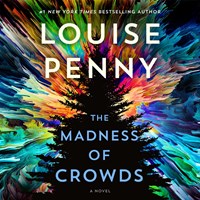Talking with Louise Penny
Louise Penny says that plotting her bestselling mysteries about Chief Inspector Armand Gamache of the Quebec Sûreté is a balancing act. “I know where the story is going, but I don’t want to hold my characters so firmly to the outline that they can’t breathe. As a result, there are always surprises.” For example, in the first draft of her newest book, THE MADNESS OF CROWDS, Penny didn’t refer to the COVID-19 pandemic until two-thirds of the way through. “I thought it would be the last thing people would want to hear about after living through so much sadness,” she explains during a Canada-Maine Zoom visit. “But then I realized that my characters’ lives were as affected by the virus as we all have been. So, by the second draft, I mentioned it on page 1!”
Set in a post-pandemic present--“a time of healing,” says Penny--the audiobook begins with Chief Inspector Gamache struggling to guard a scientist whose government-sponsored study has devolved into a mash-up of misinterpreted statistics and eugenics beliefs. When the Canadian government disassociates itself from the findings, the scientist goes public with her proposal for mandatory euthanasia of the disabled and elderly. Her speeches draw huge and fervent crowds. Soon, someone dies. “The concept dovetailed perfectly with the idea of a virus,” explains Penny. “Ideas and diseases both spread from person to person. They gain traction as they infect the population.”
The author of 18 novels about Gamache and his colleagues, family, and friends, Penny says that her books, which are “one ongoing story,” are not really about murder. “Instead, murder is a launching point to explore the issues that Gamache and others struggle with.”
In this case, the issue is eugenics coupled with mandatory euthanasia of the elderly or infirm. “The Nazis used eugenics in ways that are so clearly wrong,” says Penny. “But what about our increasing tendency to abort fetuses that have identifiable disabilities, such as Down syndrome? What about the animals we raise for experimentation? And our elderly or frail relatives? During a time of illness, for example, should they be abandoned or forced to die while we save the young and healthy?” Penny’s husband Dr. Michael Whitehead, the model for Armand Gamache, was 82 in 2016 when he died peacefully at home, having lived for several years with dementia. In contrast, many seniors died of neglect and abandonment in Canadian care homes during the pandemic, so many that several provinces have launched investigations. “These are troubling issues that exist on a continuum,” says Penny. “We need to keep wrestling with our concerns about them.”
At the same time, Penny feels strongly that the pandemic helped us rediscover the importance of kindness. “Ultimately, my books are about friendship and community. Three Pines survives because of the love that exists there. Love in all its forms--between people, people and pets, villagers who support each other even when they disagree and who don’t sweep the past under the rug. Villagers who own their past while moving forward.”
The world of Three Pines is brought to listeners’ ears by the well-known British stage and television actor Robert Bathurst, who began performing the series in 2015 after the death of longtime narrator Ralph Cosham. Penny, whose friendship with Cosham was such that she accompanied him to the Audie Awards ceremony where he won top honors for THE BEAUTIFUL MYSTERY, says about Bathurst, “It takes a special person to take on an established series. Robert is that special person. He has done wonderfully. I’m overjoyed for him and me and the readers, who I admire for persevering through the change. We’re so lucky! Everyone loves him.”
Penny, who dines with Bathurst whenever she is in London, is particularly delighted that he will join her for the final stop on her virtual book tour for THE MADNESS OF CROWDS “Robert’s just such a terrific fellow. He will be interviewing me from England. It’ll be late his time, but he’s still game! People can ask questions of either of us, so I hope we have lots of audiobook listeners. It’s going to be so much fun.”--Aurelia C. Scott
DEC 10/JAN 11 -- When Louise Penny left a successful career in journalism with the CBC to pursue her dream of writing, she had writer’s block “for about five years.” She ended up on her couch eating gummi bears and watching a lot of “Oprah.” “And then,” she recalls, “a few things happened.”
Her husband retired, and the couple moved to the small village of Sutton in Quebec’s Eastern Township, where Penny says, “I met creative friends who were creating. They gave me a seat at the table and talked about their own creations; they never asked me to explain myself.” She pauses, reflecting, “I’ve learned I’m more impressionable than I would like to believe. And that I need good role models.
If I’m in the company of cynical, dark people, I’ll become that way. If I choose my company wisely--spend time with people who value kindness and who are both thoughtful and good beings--that brings out the better angels of my nature. My creative friends taught me that failing was not the problem--it was the not trying.”
One night, after another struggle with “the big blank page” on which she’d hoped to pen a historical novel, Penny remembers looking at her bedside table, piled high with Golden Age mysteries. “And I had another aha moment: I would write a book that I would choose to read, not so my mother or a colleague would say, ‘You’re so smart.’ It would be just for me.”
Writing her first mystery led Penny to another insight about process. One of her artist friends who had been reading Penny’s drafts took her into her studio. “She pulled out a canvas, the first go at a piece of art she knew I loved. It was good but not great. And I realized why I’d had writer’s block. I’d approached my writing thinking that I had to get it right the first time. I was afraid of making mistakes. She showed me that it is a process, and that gave me the freedom to make mistakes, overwrite, create cardboard characters, verbally obese characters. To realize there are second, third, and fourth drafts.”
Though her writing is inspired by authors such as Agatha Christie and Ngaio Marsh, Penny thinks of her work as “updated traditional mysteries. Not about murder or about death, but about life. It’s a device to let me look at human nature. People are so interesting!”
Penny’s central character, the endearing Inspector Gamache, is known as an excellent listener. Indeed, Penny says, listening is one of the “cardinal qualities” that distinguishes Gamache from other senior Sûreté officers. “He listens. And he tells his team they must listen closely to what people say but also to how they say it. The words are what people are thinking; the tone is how they’re feeling. To find a killer, the investigators must listen closely to both. And decode meaning from the words.”
Penny’s thrilled at the enthusiastic reception Ralph Cosham has received as narrator of the series. “I’m 90 percent sure that the audiobooks are as successful as they are because of him. It’s perfect casting,” she says. “He’s hugely skilled, but he also really connects with the material, and particularly with Gamache. People seem to hear him as the voice of Gamache, which is lovely.”
In BURY YOUR DEAD, Penny places Gamache on the edge of a precipice. “He’s a good but flawed man, wracked by the pain of past mistakes.” Her interest in the imperfect--and in the theme that the broken places, once healed, can become even stronger--is a life philosophy that Penny also embraces.
“It goes hand in hand with a wonderful quote from Leonard Cohen, which I’ve used in at least one book: ‘Ring the bells that still can ring/forget your perfect offering/there’s a crack in everything/that’s how the light gets in.’ I spent much of my youth trying to be right and perfect, only to realize late in life that it’s the cracks, the flaws, the faults that allow us to grow and maybe become wise. And maybe become content, and compassionate. And happy.”--Jessie C. Grearson
© AudioFile 2021, Portland, Maine





